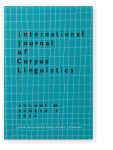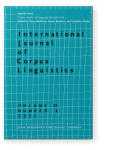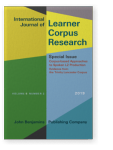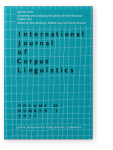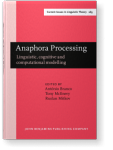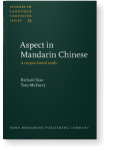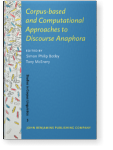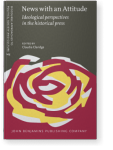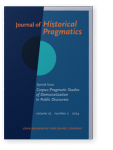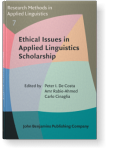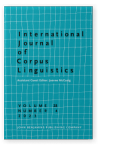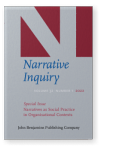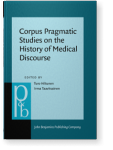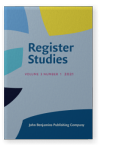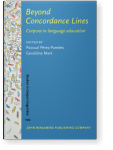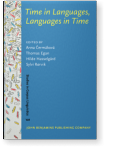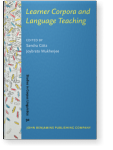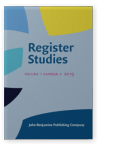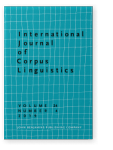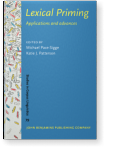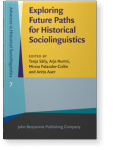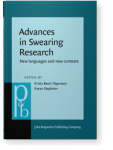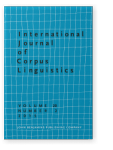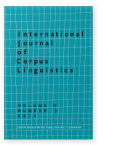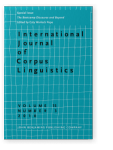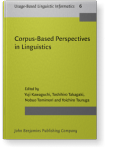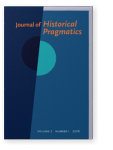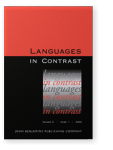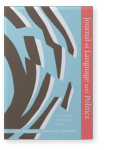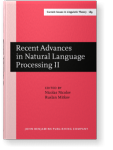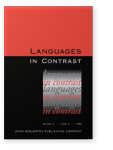Tony McEnery
List of John Benjamins publications for which Tony McEnery plays a role.
Journal
Corpus studies of language through time: Special issue of the International Journal of Corpus Linguistics 27:4 (2022)
Edited by Tony McEnery, Gavin Brookes and Isobelle Clarke
Special issue of International Journal of Corpus Linguistics 27:4 (2022) v, 161 pp.
Subjects Computational & corpus linguistics
Corpus-based Approaches to Spoken L2 Production: Evidence from the Trinity Lancaster Corpus
Edited by Vaclav Brezina, Dana Gablasova and Tony McEnery
Special issue of International Journal of Learner Corpus Research 5:2 (2019) v, 166 pp.
Subjects Applied linguistics | Corpus linguistics | Language acquisition | Language teaching
Compiling and analysing the Spoken British National Corpus 2014
Edited by Tony McEnery, Robbie Love and Vaclav Brezina
Special issue of International Journal of Corpus Linguistics 22:3 (2017) v, 145 pp.
Subjects Computational & corpus linguistics
Anaphora Processing: Linguistic, cognitive and computational modelling
Edited by António Branco, Tony McEnery and Ruslan Mitkov
[Current Issues in Linguistic Theory, 263] 2005. x, 449 pp.
Subjects Natural language processing | Psycholinguistics | Semantics | Syntax
Aspect in Mandarin Chinese: A corpus-based study
Richard Xiao † and Tony McEnery
[Studies in Language Companion Series, 73] 2004. x, 305 pp.
Subjects Corpus linguistics | Semantics | Sino-Tibetan languages | Syntax | Theoretical linguistics
Corpus-based and Computational Approaches to Discourse Anaphora
Edited by Simon Philip Botley and Tony McEnery
[Studies in Corpus Linguistics, 3] 2000. vi, 257 pp.
Subjects Corpus linguistics | Discourse studies | Pragmatics | Semantics
2025 Chapter 5. Transformations and the dynamics of memory: Gladstone and the Phoenix Park Murders News with an Attitude: Ideological perspectives in the historical press, Claridge, Claudia (ed.), pp. 82–107 | Chapter
In this study, we explore how the Phoenix Park murders were written about in public and private discourse, utilising the Nineteenth Century Newspaper Corpus, personal diaries and historiography. With the use of social actor analysis (van Leeuwen, 2008), we examine how events underwent… read more
2024 Family, politics and media: Gladstone during the Midlothian campaign, 1879–1880 Corpus-Pragmatic Studies of Democratization in Public Discourses: New perspectives, methods and materials, Hiltunen, Turo, Turo Vartiainen and Jenni Räikkönen (eds.), pp. 329–353 | Article
In this paper, we utilise the Nineteenth Century Newspaper Corpus to examine reporting surrounding William Gladstone’s Midlothian campaign, a key point in the democratization of British politics where a politician not only communicated with ordinary people through hustings but indirectly to a… read more
2024 Chapter 2. Corpus linguistics and ethics Ethical Issues in Applied Linguistics Scholarship, De Costa, Peter I., Amr Rabie-Ahmed and Carlo Cinaglia (eds.), pp. 28–44 | Chapter
In this chapter, we explore the ethical considerations attending to research and practice in corpus linguistics. Despite the ubiquity of ethical dilemmas in corpus construction and use, there has been scant literature dedicated to ethical practices within the discipline. This gap is particularly… read more
2022 Narrative evaluation in patient feedback: A study of online comments about UK healthcare services Narratives as Social Practice in Organisational Contexts, Van De Mieroop, Dorien, Jonathan Clifton and Stephanie Schnurr (eds.), pp. 9–35 | Article
This study examines how patients use narratives to evaluate their experiences of healthcare services online. The analysis draws on corpus linguistic techniques, specifically annotation, applying Labov and Waletzky’s (1967) framework to a sample of online comments about the NHS in England.… read more
2022 Keywords through time: Tracking changes in press discourses of Islam Corpus studies of language through time: Special issue of the International Journal of Corpus Linguistics 27:4 (2022), McEnery, Tony, Gavin Brookes and Isobelle Clarke (eds.), pp. 399–427 | Article
This paper applies a new approach to the identification of discourses, based on Multiple Correspondence Analysis (MCA), to the study of discourse variation over time. The MCA approach to keywords deals with a major issue with the use of keywords to identify discourses: the allocation of… read more
2022 Chapter 2. “A geography of names”: A genre analysis of nationality-driven names for venereal disease in seventeenth-century England Corpus Pragmatic Studies on the History of Medical Discourse, Hiltunen, Turo and Irma Taavitsainen (eds.), pp. 23–48 | Chapter
We investigate discourses surrounding venereal disease in a wide body of seventeenth-century texts in the one-billion-word Early English Books Online (EEBO) corpus. By combining quantitative methods with close reading of texts within EEBO, we explore whether perceptions of sufferers and… read more
2022 Corpus studies of language through time: Introduction to the special issue Corpus studies of language through time: Special issue of the International Journal of Corpus Linguistics 27:4 (2022), McEnery, Tony, Gavin Brookes and Isobelle Clarke (eds.), pp. 393–398 | Editorial
2021 Multiple Correspondence Analysis, newspaper discourse and subregister: A case study of discourses of Islam in the British press Register Studies 3:1, pp. 144–171 | Article
This article introduces a new method for grouping keywords and examines the extent to which it also allows analysts to explore the interaction of discourse and subregister. It uses the multivariate statistical technique, Multiple Correspondence Analysis, to reveal dimensions of keywords which… read more
2021 Chapter 3. Looking back on 25 years of TaLC: In conversation with Profs Mike McCarthy and Tony McEnery Beyond Concordance Lines: Corpora in language education, Pérez-Paredes, Pascual and Geraldine Mark (eds.), pp. 57–74 | Chapter
This chapter is the result of a conversation between Professors Tony McEnery and Michael McCarthy, two of the greatest names in the fields of corpus linguistics and the corpus-based analysis and teaching of the English language. They share their views and experiences of the areas discussed in… read more
2021 Slavery and Britain in the 19th century Time in Languages, Languages in Time, Čermáková, Anna, Thomas Egan, Hilde Hasselgård and Sylvi Rørvik (eds.), pp. 9–38 | Chapter
This study uses a corpus of just under two billion words from one historic British newspaper, the Liverpool Mercury, to explore shifting attitudes to slavery in Britain in the nineteenth century in the context of a port city that benefitted from the trade. In doing so, we explore three… read more
2019 Corpus-based approaches to spoken L2 production: Evidence from the Trinity Lancaster Corpus Corpus-based Approaches to Spoken L2 Production: Evidence from the Trinity Lancaster Corpus, Brezina, Vaclav, Dana Gablasova and Tony McEnery (eds.), pp. 119–125 | Introduction
2019 The Trinity Lancaster Corpus: Applications in language teaching and materials development Learner Corpora and Language Teaching, Götz, Sandra and Joybrato Mukherjee (eds.), pp. 7–28 | Chapter
Corpora and corpus techniques have long been an important source of knowledge about language; they have also been increasingly used for language teaching purposes. This chapter discusses the role of spoken learner corpora in language pedagogy and in development of language teaching materials. In… read more
2019 The Trinity Lancaster Corpus: Development, description and application Corpus-based Approaches to Spoken L2 Production: Evidence from the Trinity Lancaster Corpus, Brezina, Vaclav, Dana Gablasova and Tony McEnery (eds.), pp. 126–158 | Article
This paper introduces a new corpus resource for language learning research, the Trinity Lancaster Corpus (TLC), which contains 4.2 million words of interaction between L1 and L2 speakers of English. The corpus includes spoken production from over 2,000 L2 speakers from different linguistic and… read more
2019 Functional variation in the Spoken BNC2014 and the potential for register analysis Register Studies 1:2, pp. 296–317 | Article
This article focuses on how register considerations informed and guided the design of the spoken component of the British National Corpus 2014 (Spoken BNC2014). It discusses why the compilers of the corpus sought to gather recordings from just one broad spoken register – ‘informal… read more
2019 Usage Fluctuation Analysis: A new way of analysing shifts in historical discourse International Journal of Corpus Linguistics 24:4, pp. 413–444 | Article
This article introduces a methodology for the diachronic analysis of large historical corpora, Usage Fluctuation Analysis (UFA). UFA looks at the fluctuation of the usage of a word as observed through collocation. It presupposes neither a commitment to a specific semantic theory, nor that the… read more
2017 A corpus-based investigation into English representations of Turks and Ottomans in the early modern period Lexical Priming: Applications and advances, Pace-Sigge, Michael and Katie J. Patterson (eds.), pp. 41–66 | Chapter
Lexical priming theory (Hoey 2005) works not just at any single moment in time. For Hoey (2005: 8) words are “primed for collocational use. A word is acquired through encounters with it in speech and writing, it becomes cumulatively loaded with the contexts and c-texts in which it is encountered,… read more
2017 Ireland in British parliamentary debates 1803–2005: Plotting changes in discourse in a large volume of time-series corpus data Exploring Future Paths for Historical Sociolinguistics, Säily, Tanja, Arja Nurmi, Minna Palander-Collin and Anita Auer (eds.), pp. 83–107 | Chapter
This study investigates the changing contexts in which the word ireland appears in the The Hansard Corpus of British Parliamentary debates. It combines the use of two statistical techniques for analysis and visualization of historical data (Meaning Fluctuation Analysis and sparklines) with more… read more
2017 Chapter 8. Swearing in Italian: A redefinition of the notions of dysphemism and euphemism Advances in Swearing Research: New languages and new contexts, Beers Fägersten, Kristy and Karyn Stapleton (eds.), pp. 183–211 | Chapter
2017 The Spoken BNC2014: Designing and building a spoken corpus of everyday conversations Compiling and analysing the Spoken British National Corpus 2014, McEnery, Tony, Robbie Love and Vaclav Brezina (eds.), pp. 319–344 | Article
This paper introduces the Spoken British National Corpus 2014, an 11.5-million-word corpus of orthographically transcribed conversations among L1 speakers of British English from across the UK, recorded in the years 2012–2016. After showing that a survey of the recent history of corpora of… read more
2017 Introduction: Compiling and analysing the Spoken British National Corpus 2014 Compiling and analysing the Spoken British National Corpus 2014, McEnery, Tony, Robbie Love and Vaclav Brezina (eds.), pp. 311–318 | Introduction
2015 Collocations in context: A new perspective on collocation networks International Journal of Corpus Linguistics 20:2, pp. 139–173 | Article
The idea that text in a particular field of discourse is organized into lexical patterns, which can be visualized as networks of words that collocate with each other, was originally proposed by Phillips (1983). This idea has important theoretical implications for our understanding of the… read more
2012 The peaks and troughs of corpus-based contextual analysis International Journal of Corpus Linguistics 17:2, pp. 151–175 | Article
This paper focuses upon two issues. Firstly, the question of identifying diachronic trends, and more importantly significant outliers, in corpora which permit an investigation of a feature at many sampling points over time. Secondly, we consider how best to combine more qualitatively oriented… read more
2010 On two traditions in corpus linguistics, and what they have in common The Bootcamp Discourse and Beyond, Worlock Pope, Caty (ed.), pp. 384–394 | Article
2007 Parallel and comparable corpora: The state of play Corpus-Based Perspectives in Linguistics, Kawaguchi, Yuji, Toshihiro Takagaki, Nobuo Tomimori and Yoichiro Tsuruga (eds.), pp. 131–145 | Article
2006 The moral panic about bad language in England, 1691–1745 Journal of Historical Pragmatics 7:1, pp. 89–113 | Article
In this paper I use a corpus of the writings of the Society for the Reformation of Manners to look at the discursive construction of attitudes to bad language in English. Using this corpus of texts as an example of a moral panic about language I use keywords to explore moral panic rhetoric, the… read more
2006 Passive constructions in English and Chinese: A corpus-based contrastive study Languages in Contrast 6:1, pp. 109–149 | Article
This article combines the corpus-based and contrastive approaches, seeking to provide a systematic account of passive constructions in two typologically distinct languages, namely British English and Mandarin Chinese. We will first explore, on the basis of written and spoken corpus data, a range of… read more
2005 A corpus-based approach to discourses of refugees and asylum seekers in UN and newspaper texts Journal of Language and Politics 4:2, pp. 197–226 | Article
A corpus-based analysis of discourses of refugees and asylum seekers was carried out on data taken from a range of British newspapers and texts from the Office of the United Nations High Commissioner for Refugees website, both published in 2003. Concordances of the terms refugee(s) and asylum… read more
2000 Discourse anaphora: The need for synthesis Corpus-based and Computational Approaches to Discourse Anaphora, Botley, Simon Philip and Tony McEnery (eds.), pp. 1–42 | Article
2000 Can we improve part-of-speech tagging by inducing probabilistic part-of-speech annotated lexicons from large corpora? Recent Advances in Natural Language Processing: Volume II: Selected papers from RANLP ’97, Nicolov, Nicolas and Ruslan Mitkov (eds.), pp. 21–30 | Article
1999 Domains, text types, aspect marking and English-Chinese translation Languages in Contrast 2:2, pp. 211–229 | Article
This paper uses an English-Chinese parallel corpus, an L1 Chinese comparable corpus, and an L1 Chinese reference corpus to examine how aspectual meanings in English are translated into Chinese and explore the effects of domains, text types and translation on aspect marking. We will show that while… read more
